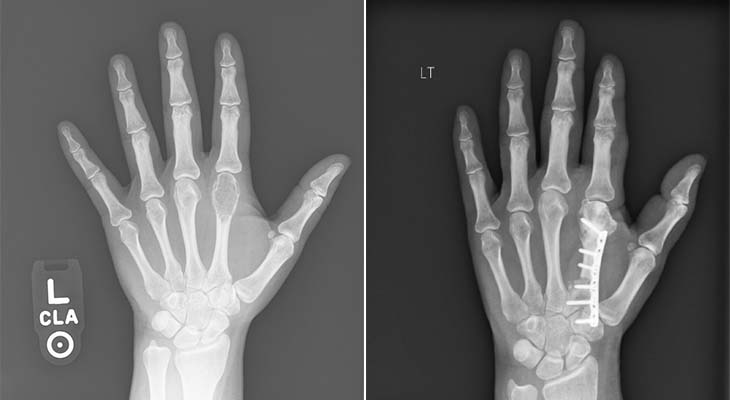Giant Cell Tumor of Bone

Overview
Giant cell tumor of bone (GCTB) is a rare, generally benign but locally aggressive tumor that usually develops at the ends of long bones, such as the femur, tibia, or radius. While most are non-cancerous, some may become malignant or recur.
Symptoms
- Localized bone pain
- Swelling or a palpable lump
- Joint stiffness or limited range of motion
- Pathologic fractures (weakened bone breaks)
Causes & Risk Factors
- Exact cause unknown
- Usually occurs in adults between ages 20–40
- Slightly more common in females
- Often arises after skeletal maturity
Diagnosis
- X-ray showing a lytic lesion near joint
- MRI or CT to assess soft tissue extension
- Biopsy to confirm diagnosis
- Rarely, staging studies to check for metastasis (e.g., lungs)
Treatment Options
- Curettage with bone grafting or cement (common initial treatment)
- Wide excision in recurrent/aggressive cases
- Denosumab (targeted therapy used pre-op or when surgery is not feasible)
- Radiation therapy (reserved for unresectable tumors)
Prognosis
- Generally good if completely resected
- Local recurrence occurs in 10–30% of cases
- Rare cases (1–2%) may metastasize, typically to the lungs
Living with this Cancer Type
- Joint rehabilitation and physical therapy post-surgery
- Surveillance imaging for recurrence
- Support for emotional and functional recovery
Prevention & Screening
- No known prevention
- Early evaluation of persistent joint pain or bone lumps
FAQs
Q: Is giant cell tumor cancer?
A: It’s usually benign but can be aggressive. Rarely, it can become malignant.
Q: Does it come back?
A: Yes, recurrence is possible, especially if not fully removed.
Q: Can it spread?
A: Rarely. When it does, it typically spreads to the lungs.
Resources
- Bone Cancer Research Trust
- National Cancer Institute
- ClinicalTrials.gov
Understand Precision Testing
Learn how liquid biopsy and chemo sensitivity testing can personalize your treatment plan.
Make Informed Decisions
Gain knowledge to actively participate in treatment discussions with your healthcare team.
Improve Treatment Outcomes
Discover how precision medicine and metabolic therapies can enhance treatment effectiveness.
Start Your Educational Journey Today
Empower yourself with knowledge about precision metabolic oncology and take an active role in your cancer care journey.
Need More Information?
Our team of oncology experts is here to help you understand your diagnosis and treatment options.
